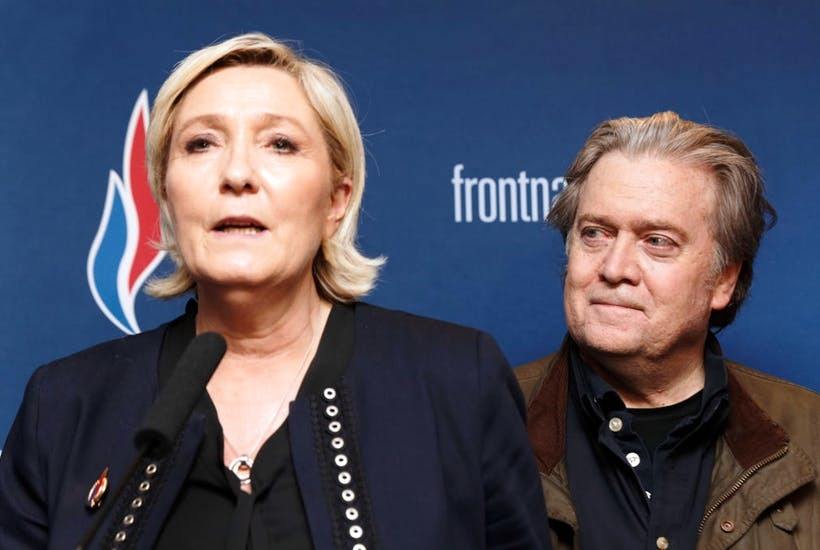It wasn’t the weekend that Marine Le Pen envisaged. When last Saturday dawned in the northern French city of Lille, the leader of the National Front probably rose from her bed with a spring in her step. Ten months on from her disastrous performance in the second round of the French presidential election here was Le Pen’s chance to get her political career back on track. Furthermore, she had a little surprise in store for the party faithful, an illustrious guest who would enhance her own international credentials.
Sure enough, Steve Bannon elicited a hearty roar from the audience when he strode onto the stage: “Let them call you racist, let them call you xenophobes, let them call you nativists,” thundered Donald Trump’s former Chief Strategist. “Wear it as a badge of honour, because every day we get stronger and they get weaker.”
Was this really what Le Pen wanted to hear? She’s spent the last seven years trying to “de-demonise” the image of the National Front and along comes Bannon with his belligerent message. To make matters worse, on the same day footage circulated on social media showing the deputy leader of the National Front’s youth wing allegedly racially abusing a man outside a Lille bar the previous evening.
Asked what he thought of Bannon’s speech, Philippe Olivier, one of Le Pen’s advisers (and her brother-in-law) said he enjoyed his “Yankee” style. However, he added, he found some of his speech rather “simple…whereas in France we like ideas.”
But that’s the thing with Bannon, he’s a straight-talker, says it how he sees it, like at the post-speech press conference when he was asked his opinion of Marion Maréchal-Le Pen. “She is not simply a rising star on the right in France, she is one of the most impressive people in the entire world,” he gushed, as Marine Le Pen looked on with a fixed smile. “I can only see great things in her future.”
Bannon encountered Maréchal-Le Pen in Maryland last month, and clearly her speech to the American Conservative Union’s CPAC conference made quite an impression. Describing it as “absolutely electrifying”, he added that France “would be very lucky if sometime in the decades ahead she would come back and dedicate herself to get back into politics.”
At this point, Marine Le Pen felt the need to step in, explaining to her American guest that journalists believed a rivalry existed between her and her niece. “They don’t understand that we defend the same ideas, in the education field for her and in politics for me,” said Le Pen, perhaps now regretting her clever idea to invite Bannon to Lille.
So why did Le Pen invite him? The cynic might wonder if it wasn’t to get back at her niece. Maréchal-Le Pen’s appearance at CPAC, on the same bill as Trump and Mike Pence, made global headlines, the sort Le Pen used to enjoy before her reputation-shredding presidential campaign. Inviting Bannon to Lille was therefore a surefire way to create a media buzz, but it was also part of her re-branding exercise.
In an interview in le Figaro last week, Le Pen explained that she believes the political struggle is no longer between left and right but a confrontation between Nationalists and Globalists, as was the case in the US election and more recently in Italy. To that end Le Pen wants to rechristen her party the Rassemblement National [National Rally], dropping the ‘Front’, which she says is a “psychological barrier” and replacing it with a word that will prompt voters who see themselves as victims of globalisation to rally to her cause.
The rebranding hasn’t quite gone according to plan, however, with Le Pen facing a legal challenge from Igor Kurek, who claims ‘Rassemblement National’ is already taken, and his small but proud Gaullist party have no intention of being bullied into submission.
The day after his appearance in Lille, Bannon accorded his only one-to-one interview in France to the weekly conservative magazine Valeurs Actuelles. Perhaps realising he had put his foot in it the previous day, Bannon made no mention of the niece; this time it was all about the aunt (once he had finished making disparaging comparisons between Emmanuel Macron and Barack Obama).
Describing Le Pen as “one of the most important political figures on the international scene”, Bannon was asked if he thought she could become president in 2022. “Those who underestimate her make the same serious error as those who under-estimated Donald Trump,” he said. “I’m neither her promoter nor her agent, but those who claim she is finished are mistaken. The future will prove it.”
But a poll published this week in Paris Match suggests that Bannon should have stuck with his Saturday sycophancy. Asked if Marine Le Pen or her niece would make the better leader, 25 per cent of respondents said the former and 50 per cent went for Maréchal-Le Pen.
The psychological barrier of which Marine Le Pen talks is as much to do with her as it is the name of her party.


















